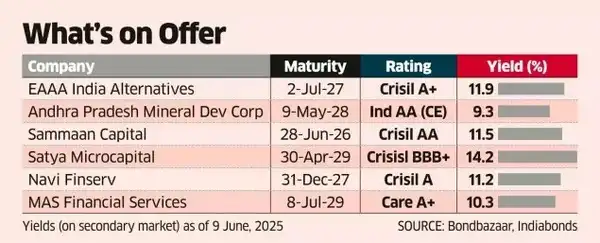Bank fixed deposits lose sheen! Post RBI rate cut, investors pick high-yielding corporate bonds; here’s why

Bank fixed deposits lose sheen! Retail investors seeking enhanced returns from fixed-income portfolios are increasingly gravitating towards corporate bonds offering higher yields. This shift has intensified following the Reserve Bank of India’s (RBI) reduction in repo rates by one percentage point since February, leading to decreased bank fixed deposit rates.These investors are focusing on state-guaranteed securities, NBFC bonds, and small finance and microfinance bonds, which provide superior returns compared to traditional bank deposits. State Bank of India’s fixed deposits with 2-3 years tenure offer maximum returns of 6.7%, whilst state-guaranteed bonds from Telangana, Uttar Pradesh, Kerala and Andhra Pradesh, with 2-4 years tenure, yield returns between 9-10%.Various retail websites offer these bonds with a minimum investment requirement of ₹10,000. These platforms, known as Online Bond Platform Providers (OBPP), are SEBI-registered entities facilitating electronic bond transactions, according to an ET report.

Corporate Bonds: What’s On Offer
Platforms such as Indiabonds, Bondbazaar, Grip Invest and Wint Wealth are experiencing increased trading activity. One platform reported doubled trading volumes in the current quarter compared to July-September 2024. Another platform witnessed a tenfold increase in new registrations compared to the previous year.Also Read | ITR Filing FY 2024-25: Have you got an Income Tax notice? Don’t ignore it! Top types of tax notices & actions required“Direct investments in bonds can typically offer an additional return of 3-5 percentage points over traditional fixed deposits,” said Bondbazaar founder Suresh Darak according to the ET report. Several NBFCs and MFI bonds with AA or lower ratings from organisations like Muthoot Capital, MAS Financial, and Edelweiss Financial could potentially deliver returns of 10-12%.Financial advisers suggest creating a diversified portfolio of these bonds instead of concentrating investments in a single bond, whilst favouring shorter durations of 2-3 years.“Investors may consider two-, three-year bonds, which balance yield potential with visibility on credit risk and interest rate movements,” said Indiabonds.com cofounder Vishal Goenka. He notes that the risk-free curve has steepened at the short to medium end with maturity of 2-3 years, making this segment attractive for those looking for better risk-adjusted returns without committing to long tenures.Also Read | Big cheer! Home loan rates head below 8% – how much will 1% RBI repo rate cut reduce your EMI or tenure? Check calculations“Diversify across issuers, tenures and ratings. Do not invest more than 10% in a single issuer, investing across one to three years helps manage reinvestment and interest rate risk and diversification ensures a risk-adjusted fixed-income portfolio,” said Darak of Bondbazaar.Wealth managers recommend that investors monitor the company’s financial performance and leadership history when purchasing high-yield bonds, considering their elevated risk levels. They advise limiting exposure by acquiring modest quantities of these bonds.(Disclaimer: Recommendations and views on the stock market and other asset classes given by experts are their own. These opinions do not represent the views of The Times of India)




